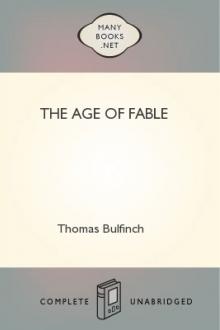Bulfinch’s Mythology, Thomas Bulfinch [love story books to read txt] 📗

- Author: Thomas Bulfinch
Book online «Bulfinch’s Mythology, Thomas Bulfinch [love story books to read txt] 📗». Author Thomas Bulfinch
Then rose a shout from those around; they congratulated the conqueror, crowding to touch his hand. He, placing his foot upon the head of the slain boar, turned to Atalanta and bestowed on her the head and the rough hide which were the trophies of his success. But at this, envy excited the rest to strife. Plexippus and Toxeus, the brothers of Meleager’s mother, beyond the rest opposed the gift, and snatched from the maiden the trophy she had received. Meleager, kindling with rage at the wrong done to himself, and still more at the insult offered to her whom he loved, forgot the claims of kindred, and plunged his sword into the offenders’ hearts.
As Althea bore gifts of thankfulness to the temples for the victory of her son, the bodies of her murdered brothers met her sight. She shrieks, and beats her breast, and hastens to change the garments of rejoicing for those of mourning. But when the author of the deed is known, grief gives way to the stern desire of vengeance on her son. The fatal brand, which once she rescued from the flames, the brand which the destinies had linked with Meleager’s life, she brings forth, and commands a fire to be prepared. Then four times she essays to place the brand upon the pile; four times draws back, shuddering at the thought of bringing destruction on her son. The feelings of the mother and the sister contend within her. Now she is pale at the thought of the proposed deed, now flushed again with anger at the act of her son. As a vessel, driven in one direction by the wind, and in the opposite by the tide, the mind of Althea hangs suspended in uncertainty. But now the sister prevails above the mother, and she begins as she holds the fatal wood: “Turn, ye Furies, goddesses of punishment! turn to behold the sacrifice I bring! Crime must atone for crime. Shall Oeneus rejoice in his victor son, while the house of Thestius is desolate? But, alas! to what deed am I borne along? Brothers forgive a mother’s weakness! my hand fails me. He deserves death, but not that I should destroy him. But shall he then live, and triumph, and reign over Calydon, while you, my brothers, wander unavenged among the shades? No! thou hast lived by my gift; die, now, for thine own crime. Return the life which twice I gave thee, first at thy birth, again when I snatched this brand from the flames. O that thou hadst then died! Alas! evil is the conquest; but, brothers, ye have conquered.” And, turning away her face, she threw the fatal wood upon the burning pile.
It gave, or seemed to give, a deadly groan. Meleager, absent and unknowing of the cause, felt a sudden pang. He burns, and only by courageous pride conquers the pain which destroys him. He mourns only that he perishes by a bloodless and unhonored death. With his last breath he calls upon his aged father, his brother, and his fond sisters, upon his beloved Atalanta, and upon his mother, the unknown cause of his fate. The flames increase, and with them the pain of the hero. Now both subside; now both are quenched. The brand is ashes, and the life of Meleager is breathed forth to the wandering winds.
Althea, when the deed was done, laid violent hands upon herself. The sisters of Meleager mourned their brother with uncontrollable grief; till Diana, pitying the sorrows of the house that once had aroused her anger, turned them into birds.
AtalantaThe innocent cause of so much sorrow was a maiden whose face you might truly say was boyish for a girl, yet too girlish for a boy. Her fortune had been told, and it was to this effect: “Atalanta, do not marry; marriage will be your ruin.” Terrified by this oracle, she fled the society of men, and devoted herself to the sports of the chase. To all suitors (for she had many) she imposed a condition which was generally effectual in relieving her of their persecutions—“I will be the prize of him who shall conquer me in the race; but death must be the penalty of all who try and fail.” In spite of this hard condition some would try. Hippomenes was to be judge of the race. “Can it be possible that any will be so rash as to risk so much for a wife?” said he. But when he saw her lay aside her robe for the race, he changed his mind, and said, “Pardon me, youths, I knew not the prize you were competing for.” As he surveyed them he wished them all to be beaten, and swelled with envy of anyone that seemed at all likely to win. While such were his thoughts, the virgin darted forward. As she ran she looked more beautiful than ever. The breezes seemed to give wings to her feet; her hair flew over her shoulders, and the gay fringe of her garment fluttered behind her. A ruddy hue tinged the whiteness of her skin, such as a crimson curtain casts on a marble wall. All her competitors were distanced, and were put to death without mercy. Hippomenes, not daunted by this result, fixing his eyes on the virgin, said, “Why boast of beating those laggards? I offer myself for the contest.” Atalanta looked at him





Comments (0)